How to Read the Bible (Easy Instructions for Beginners!)
Do you wish you could learn how to read the Bible, but you don’t know where to start?
If so, you’re not alone.
As I share in my new book, Fall in Love with God’s Word: Practical Strategies for Busy Women, 59 percent of Americans wish they could read their Bibles more often, according to the 2020 State of the Bible Report (Source).
And yet, it’s no secret that learning how to read the Bible can feel a little intimidating and overwhelming at first!
You may find yourself asking Google questions like: “What’s the best Bible reading plan for beginners?” or “How to start reading the Bible for beginners?” or “How to read the Bible for the first time?”
The good news is: Learning how to read the Bible really can be fun and easy — even for beginners! And in today’s post, I’ll show you how.
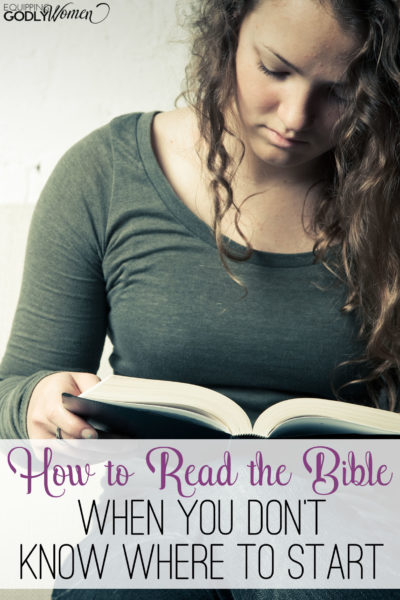
*This post contains affiliate links, which means if you make a purchase, I may make a small commission at no additional cost to you. This helps cover the many costs of running this site and allows me to help provide for my growing family. Thank you!
Learning How to Read the Bible Can Be Fun and Enjoyable!
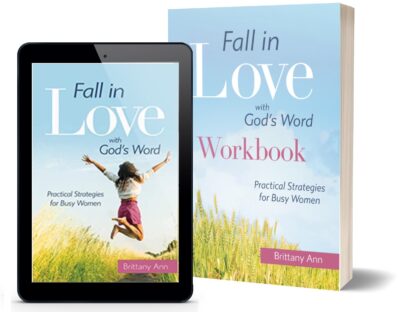
By the way, if you’re truly interested in learning how to read the Bible, I’d love to invite you to check out my brand new book: Fall in Love with God’s Word: Practical Strategies for Busy Women!
Practical, encouraging, and full of biblical truth, Fall in Love with God’s Word has everything you need to learn how to:
- Overcome 7 common obstacles preventing you from spending time in Scripture
- Discover the personalized Bible-reading routine that works for YOU
- Learn 15 easy ways to make reading the Bible for beginners more meaningful and enjoyable
- Use Scripture to conquer sin, false beliefs, and negative thought patterns
- Experience fresh spiritual growth and passion for God’s Word.
Please visit Amazon.com or your local bookstore to learn more and grab your copy of Fall in Love with God’s Word (and its companion workbook) today! OR enter your name and email below to get the first chapter for free!
How to Read the Bible (Easy Instructions for Beginners!)
Whether you don’t know how to start reading the Bible or where to begin with reading the Bible, these tips will make learning how to read the Bible a LOT easier and less intimidating for beginners!
Sure, you can still check out your favorite websites for Christian Women, blogs for Christian women, Christian Youtube Channels, and Christian podcasts for additional encouragement and inspiration (and I hope you do!)… but follow the tips in this post and you’ll know how to read the Bible for yourself as well!
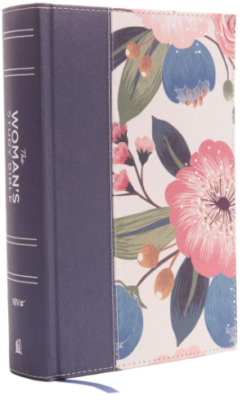
1. Choose a Study Bible in a User-Friendly Translation
The very first step to learning how to read the Bible for beginners is simply making sure you have a Bible translation you can read!
Did you know: Originally, the Bible was written in Hebrew, Aramaic, and Greek? In other words — not in English.
The English Bibles we have today are all just translations of the original language, and some are easier to read than others. And while it is true that some translations are more accurate than others, if you’re just starting out reading (not diving into deep theology), any of the common translations should be fine.
So which Bible translation should you choose?
The New Living Translation (NLT) is a great Bible translation for learning how to start reading the Bible since it’s pretty easy to read. The Message is another option. It’s paraphrased–so it’s not as accurate to the original text–but it is very user-friendly and easy to read.
Personally, my favorite Bible translation is the New International Version (NIV). I personally own a REALLY old version of this NIV Study Bible that I use for my everyday Bible. The NIV is one the most popular Bible translations out there, and it’s what I grew up with and am most comfortable and familiar with.
The English Standard Version (ESV) and the New American Standard Bible (NASB) are great choices for learning how to start reading the Bible as well. They all say essentially the same thing–just in slightly different words. And all of these Bible translations are readily available on Amazon or in any Christian Bookstore. They’re all very common.
I would avoid King James Version (KJV) or New King James Version (NKJV) if you didn’t grow up with them, however. Many people still love these Bible translations for sentimental reasons, but they aren’t the easiest translations to read when you’re still learning how to start reading the Bible for the first time!

You will definitely want to make sure the Bible you choose IS a “study Bible,” however.
Study Bibles are simply normal Bibles with additional notes and explanations in the margins to help you better understand what you’re reading. They’re so helpful!
Study Bibles aren’t just for people learning how to read the Bible, either. I’ve read the Bible for decades now, and I STILL learn a lot from reading the notes in my study Bible. (The pictures above are from an updated version of the NIV Study Bible I own and use regularly)
For example, a typical study Bible may contain:
- Book introductions that summarize the main ideas
- Additional background information you would otherwise miss
- Explanations in the margins near difficult passages
- Answers to common questions
- Word definitions
- Lists of key verses by topic
- Lists of key miracles and parables and where to find them
- Detailed maps from each time period
- And much more!
Basically, study Bibles provide a ton of additional information and explanations to help you understand what you’re reading–whether you’re learning how to start reading the Bible for the first time or you’ve been reading your Bible for years!

Alternatively, you may want to get a little Bible reference book like “Know Your Bible.”
This tiny little book is jam-packed with quick summaries for every book in the Bible, including:
- The book’s author
- The date it was written
- A one-sentence overview
- A longer summary
- Notable quotes
- Anything unique or unusual
- And a key takeaway for every book
With thousands of positive reviews and bestseller status on Amazon, this popular little book is a great one to have on hand when you’re learning how to start reading the Bible for beginners. I own this book also since it’s incredibly easy to use and very inexpensive.
You can learn more and order your own copy on Amazon here.
Tip: You can also read the Bible for free online on websites such as Biblegateway.com and Biblehub.com.
While I strongly prefer having a paper Bible, one great thing about these websites is that you can read multiple translations of the Bible all in one place. On Biblehub.com, you can even read one verse in multiple translations side-by-side to easily compare how various translations express the same idea in multiple ways.
This is SO helpful when you’re learning how to start reading the Bible, and I still use this feature quite a bit.
2. Choose Where to Start Reading the Bible
Now that you have a good Bible and you’re ready to dig in, you may be wondering how to start reading the Bible.
Let me give you a helpful tip… When you’re learning how to read the Bible for the first time: DO NOT start at the beginning and attempt to read straight through. This is a common beginner “mistake.”
The Bible isn’t like a novel where you just open up to page 1 and start reading. Rather, the Bible is more like a collection or library of individual books, poems, letters, and documents, it’s made up of lots of different genres and writing styles, and some of the Bible’s individual books are much easier to read than others.
For example, here’s a quick (oversimplified) overview of what you’ll find when you’re learning how to start reading the Bible:
Old Testament Books:
- Genesis – Exodus: Bible stories of the first people God created. Easy reading.
- Leviticus – Deuteronomy: Long lists of Old Testament law that we are not required to follow today. Very difficult reading for beginners.
- Joshua – Job: Longer, more complicated stories of the Israelites (God’s chosen people) and their “on again off again” relationship with following God. Moderately difficult reading.
- Psalms – Ecclesiastes: Quick, general Biblical advice for godly living. Easy reading.
- Isaiah – Malachi: More stories of the Israelites (God’s chosen people) and their “on again off again” relationship with following God with plenty of prophecy mixed in. Fairly difficult reading.
*Note: Roman Catholic Bibles also contain 7 Old Testament books that are not in Protestant Bibles. These books are known as the Apocrypha (to Protestants) or Deuterocanonical books (to Catholics). They include Tobit, Judith, 1 and 2 Maccabees, Wisdom, Ben Sira (Ecclesiasticus), and Baruch, as well as minor additions to Esther and Daniel. Orthodox Catholic Bibles typically include all of these plus a few more (it varies).
New Testament Books:
- Matthew – John (Also known as the Gospels): Bible stories about Jesus’s time on earth. Very easy reading.
- Acts: Bible stories about the early church. Very easy reading.
- Romans – Jude: Letters from early Christians to the churches, encouraging and instructing them in their faith. Easy reading.
- Revelation: A vision of what the end times will be like. Very difficult reading.
While it certainly won’t “hurt” anything if you start at the beginning, you’re much more likely to follow through if you have a good Bible reading plan to follow (more on that below).
Now, this isn’t to say that any of the books are “better” or “more important” than others. Second Timothy 3:16-17 tells us that:
“ALL Scripture is God-breathed and is useful for teaching, rebuking, correcting and training in righteousness, so that the servant of God may be thoroughly equipped for every good work.”
But I definitely recommend following a Bible reading plan for beginners, rather than just starting on page 1 and working your way through. (Books 3-5 are pretty tough to get through when you’re learning how to read the Bible for the first time.)
The Best Bible Reading Plan for Beginners
While you’re certainly welcome to read the Bible in any order you’d like, here’s the order I would recommend when you’re still learning how to read the Bible for the first time.
This Bible reading plan for beginners will help you cover all the key people, stories, and teachings and start with the easiest, most applicable books first before you get into the more obscure or difficult Bible books last.
- Matthew – John
- Acts
- Romans – Jude
- Genesis and Exodus
- Psalms – Ecclesiastes
- Joshua – Job, Isaiah – Malachi
- Leviticus – Deuteronomy
- Revelation
- (Optional) the Deuterocanonical books
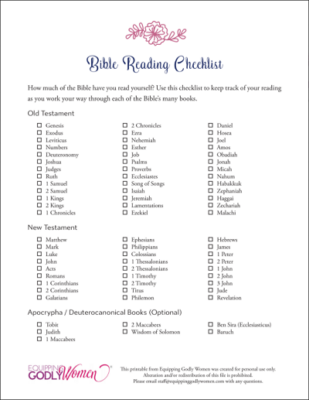
Need a Way to Keep Track of Your Bible Reading Plan?
When I was learning how to read the Bible for the first time, I loved checking off each book and chapter as I read them, so I could easily see my progress.
My NIV study Bible came with a built-in reading plan checklist right in the front. If yours doesn’t, you’re welcome to print off this Bible Reading Checklist to keep track of your progress.
It comes straight out of my Fall in Love with God’s Word WORKBOOK, but you’re welcome to have it for free.
Print it out and stick it in your Bible, or hang it on your fridge where you’ll see it often as you work your way through your Bible reading plan.
3. Consider a Devotional or Bible Study for Beginners
One great thing about learning how to start reading the Bible for the first time is that there are SO many great resources available to help you as a beginning Bible reader. You definitely don’t have to reinvent the wheel or figure everything out for yourself.
For instance, Bible devotionals typically contain a very short passage of Scripture along with the author’s thoughts and ideas on the passage and how it relates to your life, all broken up into short, daily segments. You can find devotionals on pretty much any topic imaginable (such as motherhood, grief, or worry), and they’re very accessible for beginners.
Basically, Bible devotionals do all the heavy lifting for you, telling you what the author thinks the passage is about or what you should get out of it. These are perfect for learning how to read the Bible.

Bible Studies, on the other hand, are the next step up. With a good Bible study, the author will have you read a Bible passage yourself, and then answer questions about the passage so you can uncover what it means or how it applies to you today.
Similar to devotionals, you can find Bible studies on just about any Bible passage or topic.
There are tons of women’s Bible studies out there to help you as you’re learning how to read the Bible — you can find them on just about any topic or for any book of the Bible. Just choose a book or topic that looks good to you, read the Amazon reviews for a good one, or ask a friend or women’s ministry leader for a good recommendation.
This post has 10 of the Best Bible Studies for Beginners in you’d like my recommendations for some good Bible reading plans for beginners.
OR you can find a good Bible study online for free. The First 5 App, the She Reads Truth App and YouVersion are three Bible study apps that are especially popular these days.
Devotionals and Bible studies really do make learning how to read the Bible for the first time much, much easier. And again, you can find them all over Amazon as well as in your favorite local Christian bookstore. Simply find one that looks good to you!
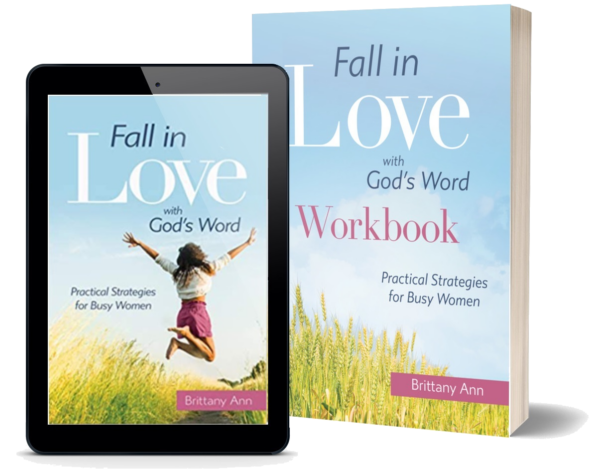
4. Create a Bible Reading Plan
As I was researching for my book, Fall in Love with God’s Word: Practical Strategies for Busy Women, I found the #1 reason why Christian women don’t read the Bible as often as we would like is that we’re TOO BUSY!
We want to read God’s Word. We know it’s important. We know it’s something we *should* do.
And yet, it seems like there are always a million things competing for our time and attention.
That’s why I devoted a whole chapter in Fall in Love with God’s Word to creating your own personalized Quiet Time Plan. Basically, rather than hoping to “get around to it….” (and then never actually getting around to it), one tip that I found SO helpful personally was to create a plan in advance.
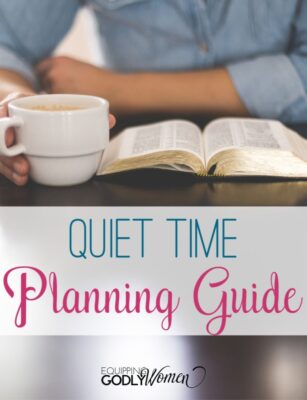
If you want to not only learn how to start reading the Bible but actually stick with it, decide in advance:
- WHEN you will read your Bible
- WHERE you will read your Bible
- HOW LONG you will read your Bible
- WHAT you will do during this time (read your Bible, pray, Bible journal…?)
- WHAT MATERIALS you will want/need (highlighters, coffee, a candle…?)
Deciding all of these details in advance can really help you make your Bible reading a habit.
Want a short printable workbook to help you find the perfect Bible reading plan for you? You can download this Quiet Time Planning Guide for free.
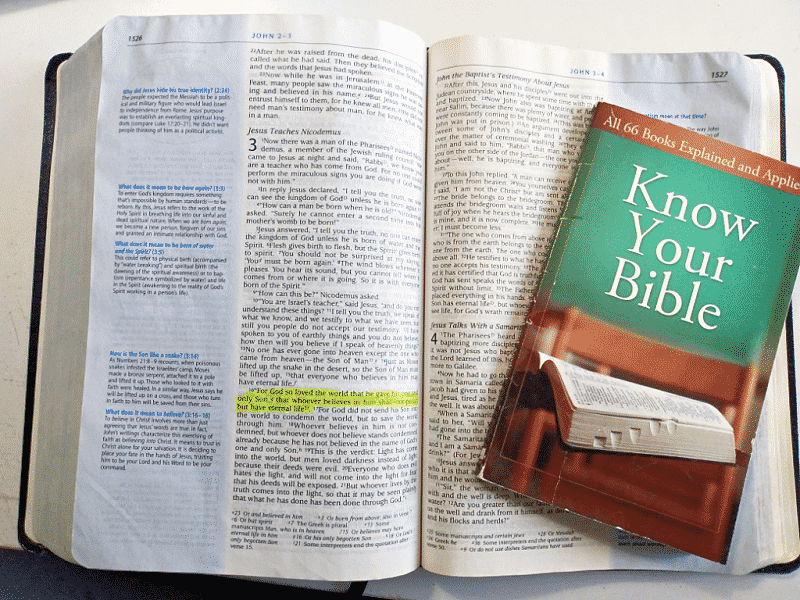
5. Get Started Reading the Bible!
Now that you have all of your materials AND your Bible reading plan for beginners, you’re ready to get started!
Thankfully, learning how to read the Bible for the first time really is easier than you might think.
Simply choose a book from the Bible reading plan for beginners above, and set a goal to read one chapter a day.
(Of course, you’re certainly welcome to read more or less than this, depending on how much time you have, but “one chapter a day” is a pretty typical starting point for anyone just learning how to start reading the Bible for the first time.)
Each “chapter” of the Bible starts with a big number. Each “verse” in the Bible starts with a small number. So a “chapter” is typically only a page or so, while a “verse” is typically only a sentence or two.
You write them like this: John 3:16 = the book of John, chapter 3, verse 16. (See the highlighted portion in the picture above.)
Don’t worry if you don’t understand every single word. I’ve been reading my Bible for decades and I still don’t understand every single word or know how to apply them all. No one does. There’s always more to learn!
But you really can learn a LOT simply by reading through a little each day, thinking about what you’re reading, and looking for ways to apply what you’re learning to your real life. The more you read and put into practice, the more you learn and grow!
Fall in Love with God’s Word
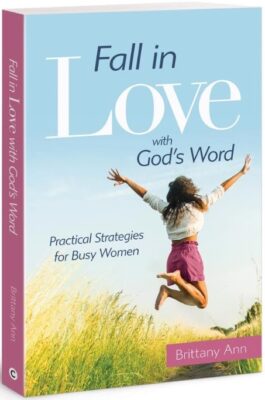
Reading God’s Word truly CAN be fun, enjoyable, encouraging, inspiring, and so much more.
If you’re truly interested in learning how to read the Bible, I’d love to invite you to check out my brand new book: Fall in Love with God’s Word: Practical Strategies for Busy Women!
Practical, encouraging, and full of biblical truth, Fall in Love with God’s Word has everything you need to learn how to:
- Overcome 7 common obstacles preventing you from spending time in Scripture
- Discover the personalized Bible-reading routine that works for YOU
- Learn 15 easy ways to make reading the Bible for beginners more meaningful and enjoyable
- Use Scripture to conquer sin, false beliefs, and negative thought patterns
- Experience fresh spiritual growth and passion for God’s Word.
Please visit Amazon.com or your local bookstore to learn more and grab your copy of Fall in Love with God’s Word (and its companion workbook) today! Or enter your name and email below to get the first chapter for free!
Additional Resources for Learning How to Read the Bible
Here at Equipping Godly Women, I have a TON of resources to help you learn how to read the Bible whether you are a beginner or advanced reader!
Here are a few additional posts you may enjoy:
How to Read the Bible Daily (And Make it a Habit)
Do You Truly Enjoy Reading the Bible? You Can!
How to Study the Bible for Yourself (Easy Beginner Method)
How to Stop Getting So Distracted During Prayer and Bible Study
Struggling to Read the Bible Consistently? Here are 7 Reasons Why
Create Your Own Bible Study Basket
10 Best Bible Studies for Women to Help You Grow in Faith
What to Look for In a Women’s Bible Study
7 Best Bible Study Apps for Christian Women — All Free!
Are you ready to learn how to start reading the Bible? What one step will you take today to learn how to read the Bible?

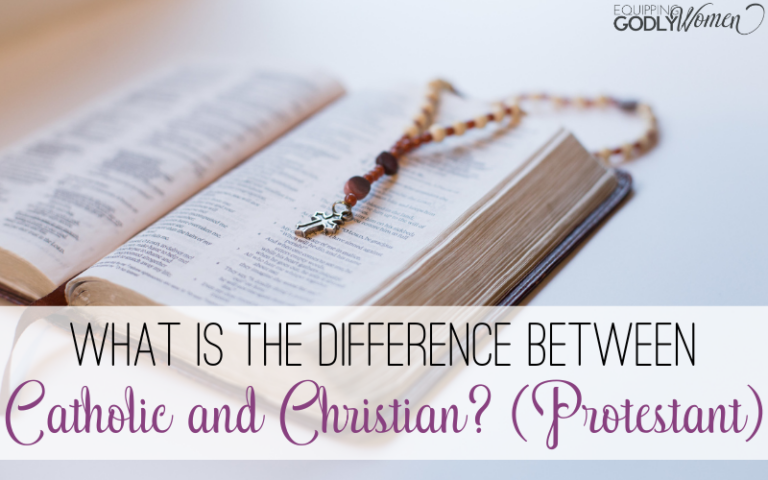
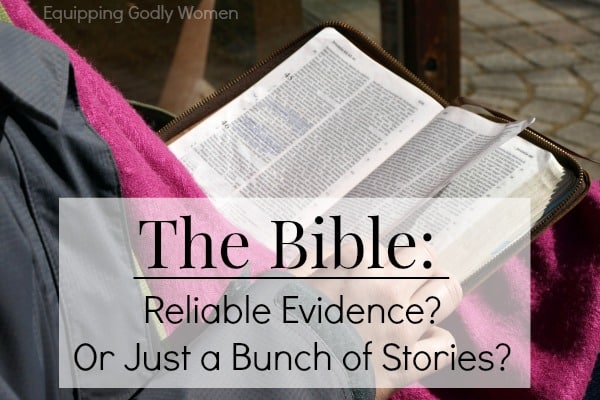
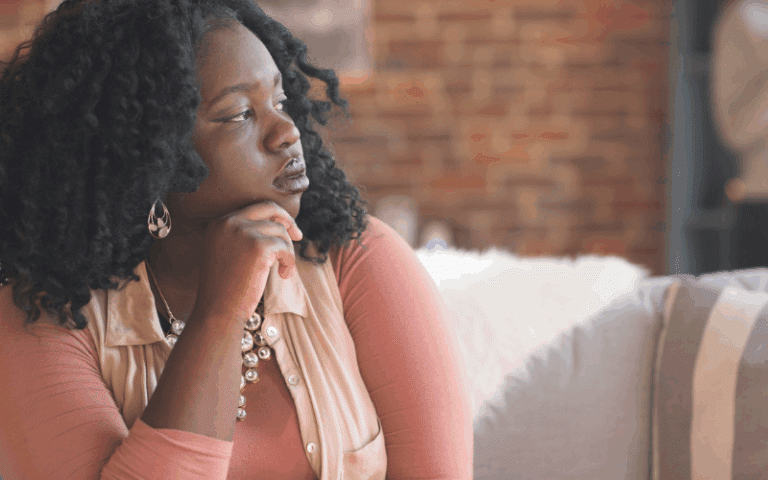
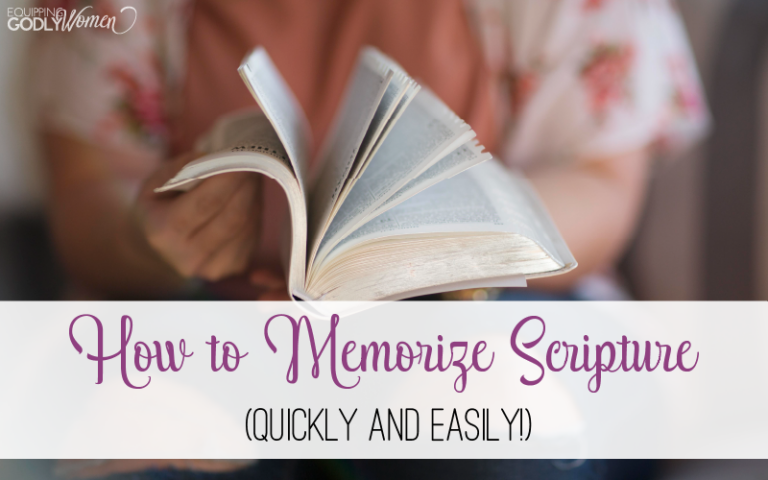

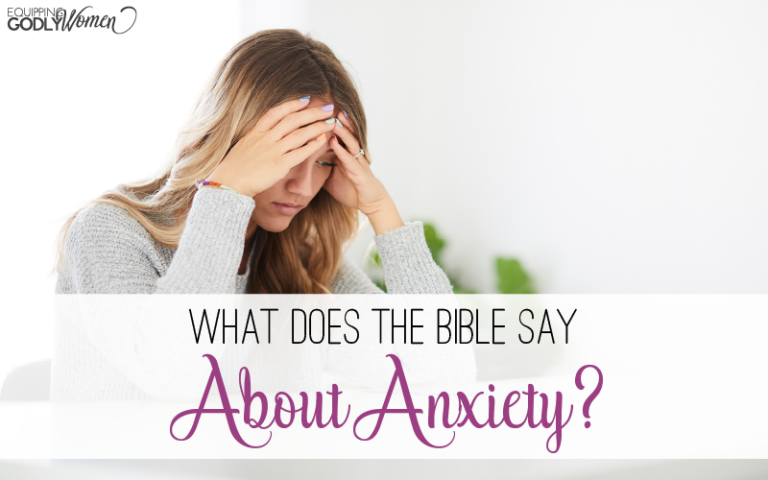
I know that it’s been a struggle for me for years to consistently read the Bible, even though once I start I am sometimes amazed at what I learn. I am realizing that I really need the guidance of the Bible. BTW I didn’t see Song of Songs listed under your lists. Did you forget to include the book?
Of course
The Bible is definitely not easy to understand.
I hope this article was helpful in showing you how to read and understand the Bible.
is there one of these for men?
While most of the articles are geared toward women (because most of my audience happens to be women!), I think a lot of the articles can be useful for both men and women, including this article. I would love for you to take a look around the website and see what articles are helpful for you.
“Old Testament law that we are not required to follow today.”
This is simply not true. “Do not think that I have come to abolish the Law or the Prophets; I have not come to abolish them but to fulfill them.” Matthew 5:17
Yeshua was saying that he was perfect with pure blood to wash us clean and to be our Passover lamb.
When people just pick and choose scripture I believe it does harm and not good to me believers.
I also agree that Levitacus is a difficult book to read UNLESS you want to understand Adonai’s laws.
I agree! I’m struggling thru Leviticus but I’m learning a lot about the how and whys things were set up.